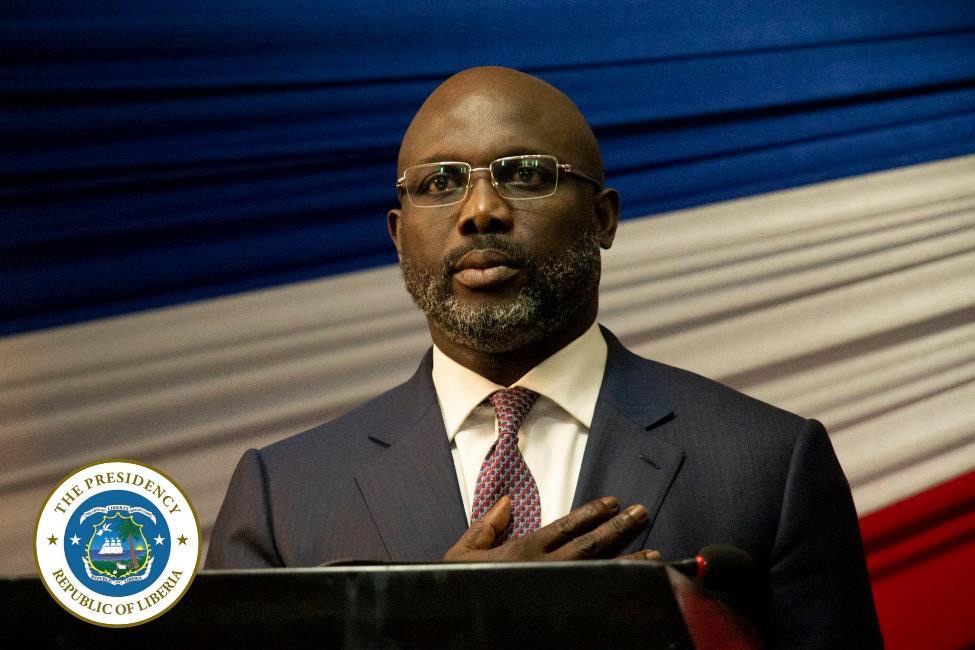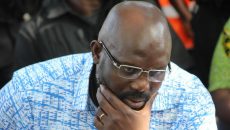MONROVIA, Montserrado – In his third State of the Nation Address, President George Weah has blamed Liberia’s weak domestic economic performances on global economic uncertainties and slow recovery following recent global recession. These developments, the president said, adversely impacted Liberia’s economic performance largely through weak trade, geopolitical tensions, and country-specific effects.
Addressing a joint session of the 54th National Legislature, Pres. Weah said Liberia’s domestic macro-economic environment was difficult and characterized by low growth of less than one percent, annual inflation of more than 20 percent, and depreciation of the Liberian dollar by more than 20 percent.
In the last quarter of 2019, however, the president said inflationary pressures were successfully contained, reflecting a modest appreciation of the Liberian dollar. Inflation is now projected to fall from its May 2019 position of 30.6 percent, to 25.8 percent in May 2020.
Throughout 2019, inflation posed the greatest macro-economic challenge to the Liberian economy and government’s fiscal standing. Reduction in inflation was, therefore, a crucial goal of government. Many believe the inflationary challenges are related to the infusion of excess Liberian dollars within the money market at the close of the year in 2017, as well as government’s subsequent attempt to address the problem through a failed US$25 million exercise to ‘mop-up’ excess liquidity, in which massive corruption was reported.
Following these fiscal challenges, the president disclosed that the government was under pressure to engage the International Monetary Fund for assistance in December, leading to the signing of a Memorandum of Economic and Financial Policies by which the IMF recently approved an External Credit Facility of US$213.6 million. Some US$23 million was recently provided to the government under the facility, the president said.
Weah said the partnership with the IMF would stabilize the macroeconomy through more effective fiscal and monetary policies and improved governance of the financial and monetary sectors.
A crucial part of government’s plans to address the macro-economic dive was crafting and passing a “credible†national budget. In this regard, a national budget of US$526 million was recently passed which sought to align and overcome the mismatch between public spending and revenues collected in the 2018/19 budget. The president promised that “we have taken steps to control spending so that we significantly reduce the deficit by the end of the fiscal year.â€
On the issue of government’s wage bill, a sticky area of the government’s agreement with the IMF, the president spoke rather boldly and optimistically.
“Reducing the public wage bill is a long-standing, politically-sensitive problem, that prior administrations were afraid to touch; but we had the courage to do so because we believe it will make everyone better off in the long run,†he said.
“We took no pleasure in reducing salaries for government employees through the harmonization process. And we fully understand the pain and hardship that this has caused and we want to thank all civil servants and government workers for their patience and understanding.â€
President Weah reminded his audience that he was among the first to unilaterally announce a 25 percent reduction in his salary as president and that he sustained further cuts when the government-wide harmonization exercise eventually commenced.
But it is unclear how significantly this symbolic gesture affected government’s overall wage burden. After all, the president still flies private jets and continues to access and expense off-budget resources.
According to Weah, not only was government wage bill too high, but it also contained deep inequities.
“For example, a secretary in one ministry or agency could be paid US$400 while another secretary with the same level of skill or education in another ministry would be paid US$1,500,†he said.
Eliminating the General Allowance system and introducing one standardized and harmonized salary mechanism across government was one of the biggest transformations in public incentives in the last year. According to the president, one of the outcomes of this process was that “it increased the income of almost 15,000 public workers, including teachers and security personnel.â€
President Weah used his Annual Message to recount other major achievements of his administration over the previous year, including free tertiary education at public universities, the continual payment of fees for the West African Senior Secondary Certificate Exams taken by graduating seniors, and a long list of road projects.
He declared: “I am determined to uphold my pledge that under my administration, Liberians will no longer be spectators in the economy of their country, this is why I note with pride and satisfaction the involvement of these local contractors which represents the surest way of ensuring sustainability of these projects in the road sector.”
Apart from the president’s almost two-hour speech, a very notable feature of the address was the deeply uncomfortable public demeanor displayed by Vice President Jewel Howard-Taylor, who was seated on stage as Weah spoke. Howard-Taylor kept a stern facial expression, hardly once smiling. She rarely applauded any remarks by the president throughout the entire address.
Of late, tensions have developed between the president and his deputy. Those tensions intensified when leaked recording of the ruling party chairman, Mulbah Morlu, revealed a deliberate plan by the president, Minister of State Nathaniel McGill, and Finance Minister Samuel Tweah, to suffocate the Office of Vice President Office for fear of empowering her political ambitions for the presidency.
Howard-Taylor has formally complained to the Senate regarding the budgetary neglect, even threatening to boycott the State of the Nation Address, had she not been dissuaded by members of the Senate.
Opposition political parties are yet to officially respond to the president’s State of the Union address. Many are expected to give rebuttal statements beginning today, Jan 28.
Featured photo by the Executive Mansion



